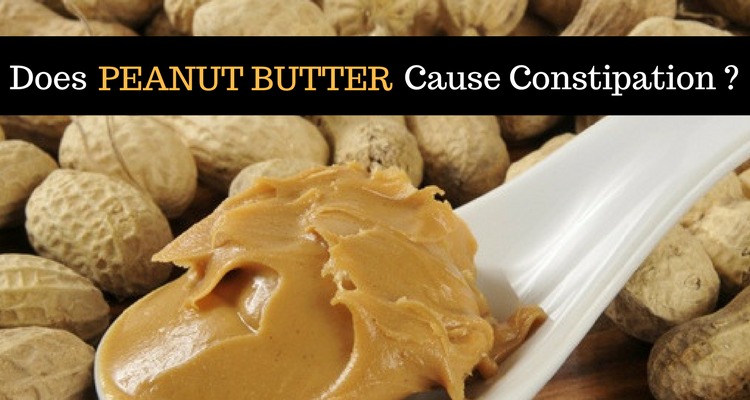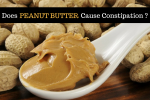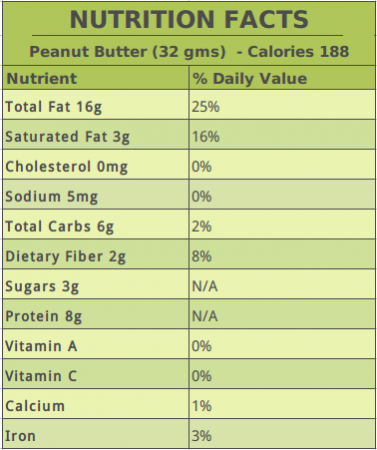
Peanut butter is a spread made of roasted and ground peanuts. However, manufacturers add salt, sweeteners, and emulsifiers to get a better taste. Some of them add partially hydrogenated vegetable oil which reduces the nutrition value of peanut butter. Peanut butter is a popular food, especially in the U.S. But, does peanut butter cause constipation? To know the answer to this, you need to know about peanut butter fiber content.
Does Peanut Butter Cause Constipation?
Peanut butter does not cause constipation. In fact, peanuts have a decent amount of fiber. Peanut butter is a good source of both soluble and insoluble fiber.
Peanut Butter Nutrition Chart
Soluble Fiber in Peanut Butter
A tablespoon of peanut butter contains 0.3 grams of soluble fiber. The amount of soluble fiber present is equal to those of high-fiber foods such as a slice of whole wheat bread, or three-quarters of a cup of blueberries.
The soluble fiber in peanut butter is in the form of gum, pectin, and mucilage contained within the plant cells. Soluble fiber absorbs water and forms a thick gel in the digestive system.
Consuming soluble fiber helps you feel full for a longer period. It helps in weight loss and lowers cholesterol. Soluble fiber also reduces the risk of diabetes.
Insoluble Fiber in Peanut Butter
A tablespoon of peanut butter has 0.7 grams of insoluble dietary fiber. All the main constituents of insoluble fiber—namely cellulose, hemicellulose and lignin—are present in plant cells.
Peanut butter has more insoluble fiber than watermelon, cucumber, grapes, and raisins. The amount of insoluble fiber present in a tablespoon of peanut butter is equal to that of a cup of mushrooms, three dried prunes, or a dozen of fresh berries.
Insoluble fiber adds bulk to stools and makes the passage of stools easier. It also helps regulate bowel movements. Regular intake of insoluble fiber foods may also prevent colon cancer, intestinal ulcers, and hemorrhoids.
Both soluble and insoluble fibers are important to ease constipation. Fiber makes food move quickly through the digestive tract. It reduces the risk of diverticulitis by 40% and prevents constipation.
The Side Effects of Peanut Butter
Although peanut butter has good amounts of fiber, in some cases it may cause constipation. Here are a few adverse effects.
Related: 6 Reasons You Shouldn’t Eat Peanut Butter
1. Induces IBS
People with irritable bowel syndrome (IBS) may suffer from constipation after consuming peanut butter. IBS is a digestive disorder that causes symptoms such as stomach pain, cramping, and diarrhea. IBS may also cause abnormal bowel movements, bloating, and hard or lumpy stools.
2. May cause an allergic reaction
Some people might be allergic to peanuts or any nuts in general. Such people shouldn’t consume peanuts in any form.
3. May cause weight gain
Eating too much of peanut butter may lead to gastrointestinal problems and weight gain. Peanut butter is high in saturated fat and may have added sodium chloride and sugar, so moderation is key. You should not eat peanut butter as the only source of fiber.
To prevent constipation, you should accompany peanut butter with other sources of dietary fiber. For instance, you can spread it on a slice of whole grain bread and add some veggies such as lettuce or spinach. Doing this will increase the fiber content, as well as the overall nutritional content of the meal.
Do Peanuts Cause Constipation?
A one-ounce serving of dry, roasted peanuts contains two grams of dietary fiber. The amount of fiber present in the same serving size of peanut butter is equal. Peanuts don’t cause constipation, but they should be consumed in moderation.
Foods to Eat to Avoid Constipation
Here are some more nutritious foods that you can add to your diet to relieve constipation and improve bowel movements.
1. Almonds
Almonds and other nuts are one of the best foods to eat to avoid constipation. A one-ounce serving of almonds contains three grams of dietary fiber.
You can add them to your salads, breakfast cereals, or just eat them on their own. Almonds are also beneficial for skin and hair.
2. Yogurt
Yogurt contains live active bacterial cultures known as probiotics. It restores good bacteria in the gut. According to a study published in The American Journal of Clinical Nutrition, probiotics help increase bowel frequency by 1.3 times per week.
3. Flaxseeds
A tablespoon of whole flaxseeds contains three grams of dietary fiber. Flaxseeds are also a good source of protein.
You can sprinkle some roasted flaxseeds on your salad or toast. Add grounded flaxseeds to whole wheat bread, soups, or smoothies.
4. Broccoli
This cruciferous vegetable has good amounts of fiber. It is packed with nutrients and is low in calories, too. Raw broccoli contains more fiber than cooked.
You can boil, bake, or steam it. Introduce it in your diet to relieve constipation symptoms.
5. Whole grains
Consuming whole grains helps relieve constipation. Whole grain bread is high in dietary fiber and low in fat. It also contains complex carbohydrates. However, it is important that you look at the ingredients on the package label.
In conclusion, peanut butter is good for your health if eaten in moderation. Does peanut butter cause constipation? No, it does not, unless you have IBS or are allergic to nuts.
Peanut butter has some saturated fats, but it also rich in vitamin E, manganese, niacin, vitamin B6, folate, omega-6 fatty acids, and trace amounts of other nutrients. It has phytosterols and good am














